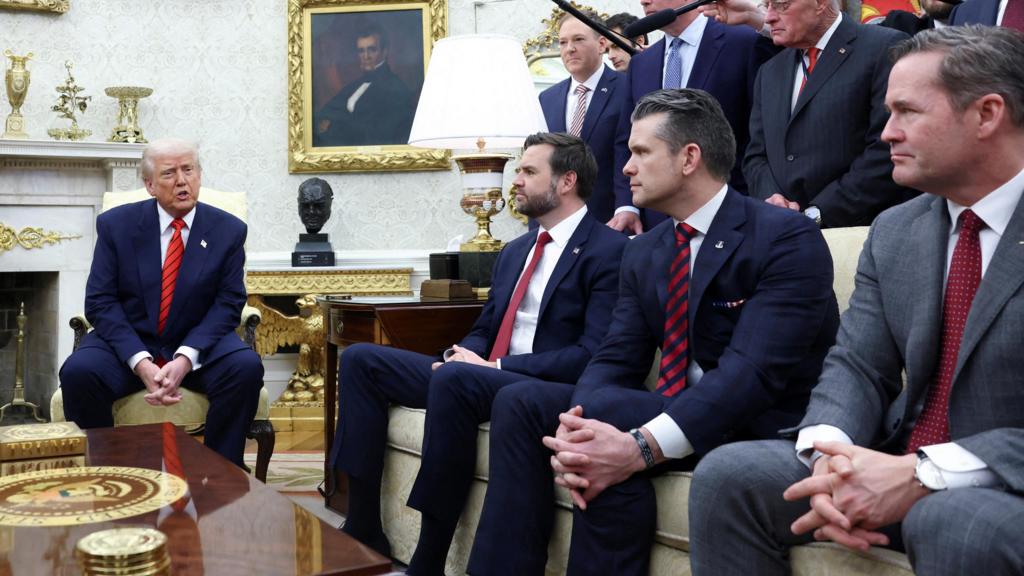By Chinasaokwu Helen Okoro
The White House confirms that a journalist was inadvertently added to a group chat where senior US officials discussed plans for a strike against the Houthi rebel group
Editor-in-chief of the Atlantic, Jeffrey Goldberg, says he received an invite on the encrypted messaging app Signal from an account labelled White House National Security Adviser Michael Waltz
Goldberg reports that the officials also discussed the potential for Europe to pay for US protection of key shipping lanes, with the account appearing to be VP JD Vance saying: “I just hate bailing Europe out again”
Defence Secretary Pete Hegseth, who is alleged to have shared details of planned military strikes in the chat group, tells reporters “nobody was texting war plans”
Trump’s national security team’s chat app leak is a stunning failure, writes BBC’s Anthony Zurcher
US President Donald Trump says he “doesn’t know anything” about the group chat.
Among the messages reported by Atlantic editor-in-chief Jeffrey Goldberg is that US officials in the Signal chat had also discussed the potential for Europe to pay for US protection of key shipping lanes.
“Whether it’s now or several weeks from now, it will have to be the United States that reopens these shipping lanes,” the account associated with White House National Security Advisor Michael Waltz wrote on 14 March.
The message continued, saying that at Trump’s request, his team was working with the defence department and state department “to determine how to compile the cost associated and levy them on the Europeans”.
At one point in the thread the JD Vance account, the name of the vice-president, griped that the strikes would benefit the Europeans, because of their reliance on those shipping lanes, adding: “I just hate bailing Europe out again.”
The user identified as Pete Hegseth, the defence secretary, responded three minutes later: “VP: I fully share your loathing of European free-loading. It’s PATHETIC.”
How a journalist was added to a classified group chat –
On 15 March, the US launched what it described as a “decisive and powerful” series of air strikes against the Houthis in Yemen.
Four days earlier, on 11 March, Jeffrey Goldberg writes that he received a connection request on the encrypted messaging app Signal from an account that purported to be White House National Security Adviser Michael Waltz’s.
Signal is used by journalists and Washington officials because of the secure nature of its communications, the ability to create aliases, and send disappearing messages.
Two days later, Goldberg said he was added to a Signal chat entitled “Houthi PC small group”.
A number of accounts that appeared to belong to cabinet members and national security officials were included in the chat, Goldberg reported.
Accounts labelled “JD Vance,” the name of the vice-president; “Pete Hegseth,” the Defence Secretary; and “John Ratcliffe,” the director of the Central Intelligence Agency; were among names in the chat. Top national security officials from various agencies also appeared to be added.
Goldberg says he watched as the group chat discussed targets and timings for military strikes. And those plans appeared accurate when US later launched air strikes on Houthis in Yemen that matched details from the group chat.
Who is Jeffrey Goldberg, the Atlantic’s editor-in-chief?
Jeffrey Goldberg on stage in front of a black background
Image source,Getty Images
Jeffrey Goldberg is the editor-in-chief of The Atlantic, a Washington DC-based magazine that publishes articles on politics, business and the economy, foreign affairs, culture and the arts, technology, and science.
He has worked there since 2007, when he joined as a national correspondent before taking over as editor-in-chief in 2016. The magazine won its first Pulitzer Prizes under his leadership in 2022, as well as a variety of other awards.
And, as we know now, Goldberg was also part of a classified conversation where senior US government officials
discussed military strikes on a foreign country.


